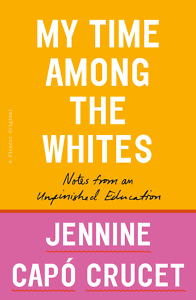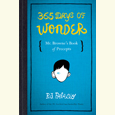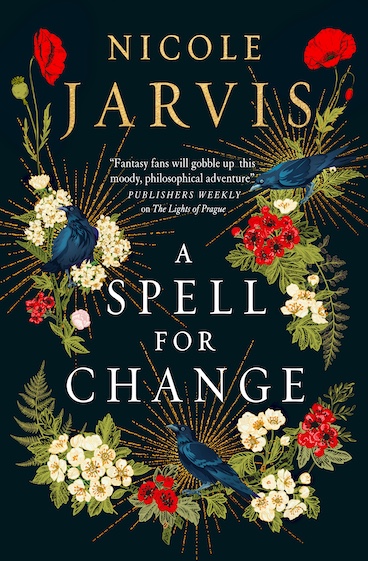Miami Meets Middle America
A Cuban American writer recounts the revelations of her own otherness in white America
My Time Among the Whites, novelist Jennine Capó Crucet’s memoir in essays, opens with an anecdote about her experience entering Cornell University as the first of her Cuban American family to attend college. It’s a story that, like many in the book, is equal parts funny and devastating.

“It was a simple question,” she writes, “but we couldn’t find the answer in any of the paperwork the college had sent: How long was my family supposed to stay for first-year student orientation?” In absence of an answer, her parents, grandmother, and younger sister saved for months to book a week’s stay in Ithaca for what they thought was an orientation for the whole family, only to be dismissed after the dean’s welcome speech. They stayed anyway, shopping for textbooks, tagging along as Crucet registered for classes, and eating together in the dining hall, her mother setting the table with napkins and forks as she did at home.
With tenderness, humor, and unflinching candor, Crucet explores a wide spectrum of the first-generation American experience from the unique perspective of a Cuban American born and raised in Miami. Due to the preponderance of Cuban people and culture in the city, she explains, “to be Cuban in Miami was to be a kind of white, with all the privileges and sense of cultural neutrality whiteness affords.”
As refugees themselves, however, her parents understood their position differently. Crucet recounts how as a girl, she was “loud and joked around a lot, my best material straight rip-offs of the Muppets, mostly Fozzie Bear.” Her mother would compare her unfavorably to one of her classmates, a quiet, conventionally pretty white girl, once even going so far as to say that she wished Amanda were her daughter. Crucet is frank in her retrospective assessment: “Her ideal daughter was a white girl because she had long internalized the idea that as Latinas, we’d be treated as lesser, that we were somehow lesser. And she just wanted better for me, which meant: whiter.”
 Pretty much every experience Crucet has after leaving Miami helps disabuse her of her internalized whiteness, beginning with arriving at college unaware that she would be one of few Latinx or Hispanic students at Cornell and not even understanding that she would be thought of in that generalized way. In Miami, she was Cuban, and “thought every place was like the one I was raised, where distinctions about country of origin were extremely significant and thus were never, ever erased. In college I became Latina to find community, to survive.”
Pretty much every experience Crucet has after leaving Miami helps disabuse her of her internalized whiteness, beginning with arriving at college unaware that she would be one of few Latinx or Hispanic students at Cornell and not even understanding that she would be thought of in that generalized way. In Miami, she was Cuban, and “thought every place was like the one I was raised, where distinctions about country of origin were extremely significant and thus were never, ever erased. In college I became Latina to find community, to survive.”
In the humorous essay “Say I Do,” a 23-year-old Crucet is planning her wedding to her college boyfriend, a white man from California. The most fraught issue to navigate becomes the choice of music for the reception. Crucet’s mother insists on hiring Freddy J, a Cuban DJ whose solution to bridging the cultural divide between her Cuban family and her fiance’s Midwestern tribe is to “kick all those Americans out of there. They don’t dance. They don’t nothing. They are dry and they’re just gonna sit the whole time anyway, so that’s step one, forget about them. That’s a lost cause.” After her divorce many years later while living in Lincoln, Nebraska, Crucet rents a loft in the same building as a popular wedding venue and — weekend after weekend — learns more than she ever wished to know about white wedding culture and the DJs spinning in its orbit.
In one of her most searing essays, “Imagine Me Here: Or, How I Became a Professor,” Crucet recalls a student she recently encountered as a guest lecturer. The young white woman becomes agitated and angry during a discussion on equitable faculty representation in institutions of higher learning, claiming that it would be “racist” to intentionally hire faculty of color to correct a historical imbalance. The student continues to argue until she makes herself cry. After the talk, Crucet writes, “I resisted the pull to walk up to her, squat down, engage her even more. I ignored the tears of this one white woman the way we all should ignore them when much more is at stake and turned instead to the group of four women of color and two white women who’d materialized near the front of the stage, students who mattered just as much, each of them clutching my novel — about a girl a lot like them, doing exactly what they were doing — across their chests as if it were a new kind of armor.”
Crucet’s point of view is fearless and funny, and while she doesn’t shy away from calling out inequity, bigotry, and dysfunction from all quarters, she also treats the people, places, and situations that populate her personal history with gentleness and respect. My Time Among the Whites offers an astute and moving account of the experience of otherness in white America.

Kathryn Justice Leache lives Memphis, her hometown. She writes for BookPage and serves as social media and promotions coordinator for Novel, an independent bookstore in Memphis.


